

Why A Good Life Need Not Be a Long Life. "I know I will not make old bones," says Achilles in Christopher Logue's modern Iliad.
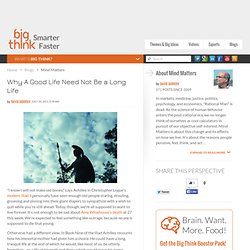
I personally have seen enough old people staring, drooling, groaning and pissing into their giant diapers to sympathize with a wish to quit while you're still ahead. Today, though, we're all supposed to want to live forever. Ed — #500words – Eleanor Jackson. Deregistration [from school] on demand - a vital civil liberty. ... and one which successive UK governments have tried to chip away at with typically Fabian strategy for years.
![Deregistration [from school] on demand - a vital civil liberty](http://cdn.pearltrees.com/s/pic/th/sometimes-deregistration-11505645)
Why is it of interest to home educators that the right of parents to deregister their children from school on demand be maintained? Elaine Greenwood-Hyde says it better than I can: Deregistration on demand is an incredibly important law for home educators and any tinkering will produce problems. It’s a very slippery slope. It is parents who are legally responsible, so when we deregister it should not be up to the government to say: "No, no … you have to wait 20 days. " Here's the latest, and here's the schedule for these changes: By 21 March - responses receivedW/c 28 March* - regulations to be signedBy 1 April* - regulations laid in parliament6 April - House rises for recess......On 1 September* - regulations come into force* these timings depend on nature and content of the comments received from this letter.
Ed — #500words – James Clay. What is the purpose of education (in 500 words or fewer)? - Comment - TES Connect. Comment:5 average rating | Comments (1)Last Updated:2 April, 2011Section:Comment One question, many answers … Below are five contributions from teachers and educationalists to the global Purpos/ed online debate ‘Be brave enough to let my son fail’ - Tom Barrett, deputy headteacher of an English primary school, recognised for his work with educational technology Six or seven years ago, my answer to this question would probably have been different.
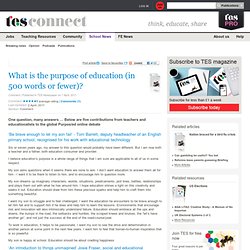
But I am now both a teacher and a father, both education consumer and provider. I believe education’s purpose is a whole range of things that I am sure are applicable to all of us in some respect. My son asks questions when it seems there are none to ask. My son dreams up imaginary characters, worlds, situations, predicaments, plot lines, battles, relationships and plays them out with what he has around him. What is the purpose of education? Here is my contribution to the Purpos/ed project.
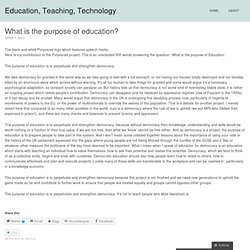
This is an unsolicited 500 words answering the question: ‘What is the purpose of Education’. The purpose of education is to perpetuate and strengthen democracy. We take democracy for granted in the same way as we take going to bed with a full stomach, or not having our houses totally destroyed and our families killed by an enormous wave which arrives without warning. It’s all too human to take things for granted and some would argue it’s a necessary psychological adaptation, as constant anxiety can paralyse us. But history tells us that democracy is not some kind of everlasting stable state, it is rather an ongoing project which needs people’s contribution. The purpose of education is to perpetuate and strengthen democracy, because without democracy then knowledge, understanding and skills would be worth nothing or a fraction of their true value. Ed — #3×5 – Giving up the artificial reins. Purpos/ed - what's the purpose of education?
Purpos/ed — Newsletter. Purpos/ed — Twitter. Purpos/ed — 500 words. Purpos/ed — About. We’re a non-partisan, location-independent organization aiming to kickstart a debate around the question: What’s the purpose of education?
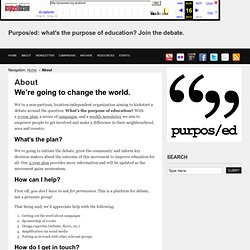
With a 3-year plan, a series of campaigns, and a weekly newsletter we aim to empower people to get involved and make a difference in their neighbourhood, area and country. What’s the plan? We’re going to initiate the debate, grow the community and inform key decision makers about the outcome of this movement to improve education for all. Our 3-year plan provides more information and will be updated as the movement gains momentum. How can I help? First off, you don’t have to ask for permission. That being said, we’d appreciate help with the following: Getting out the word about campaignsSponsorship of eventsDesign expertise (website, flyers, etc.)Amplification via social mediaPutting us in touch with other relevant groups. Purpos/ed — 500 words. Ed — #500words – Eleanor Jackson. Purpos/ed — #500words – Dean Groom. Purpos/ed — #500words – Mark Berthelemy. Purpos/ed — #500words – Cristina Costa. Purpos/ed — #500words – Leon Cych. Purpos/ed — #500words – Stephen Downes.
Purpos/ed — #500words – Frances Bell. Purpos/ed ? #500words ? Ewan McIntosh. Purpos/ed — #500words – Fred Garnett. Purpos/ed — #500words – Lou McGill. Having a voice… I recently contributed a post for purpos/ed (which is about opening a debate around education) with my partner and son which I hope offered a voice for people outside the formal education system.
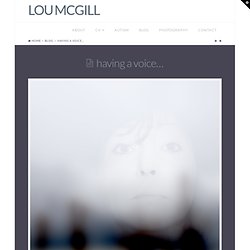
I think we questioned that system and presented one view from the home education/home learning perspective and also from the perspetive of people living with autism every day… The post actually had a really positive response (I confess I was a little suprised that no one challenged it – after all to a large extent is questions what most parents choose to do and what most educators are trying to do). One of my colleagues has since said that they are enjoying the ‘purposed’ discussion so far but would like other voices from non formal education. He suggested some people – all interesting thinkers for sure . Bridge to Learning - Educational Research. I’ve been enjoying the Purpos/ed debate on the purpose of education.
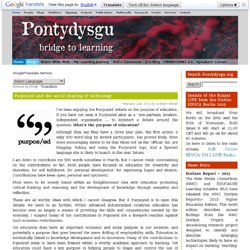
If you have not seen it Purpos/ed aims as a “non-partisan, location-independent organization … to kickstart a debate around the question: Although they say they have a three year plan, the first action, e daily 500 word blog by invited participants, has proved lively. Even more encouraging seems to be that those not on the ‘official’ list, are blogging, linking and using the Purpos/ed logo. And a Spanish language site is likely to launch in the near future.
Purpos/ed — #500words – Jon Nicholls. Purpos/ed — #500words – Jennifer M Jones. Purpos/ed — #500words – Douglas Greig. Purpos/ed — #500words – Oliver Quinlan. Purpos/ed;the purpose of education. Http ://purposeducation.wikispaces.com/ It’s easy to make the assumption that we are all in the job for the same reason.
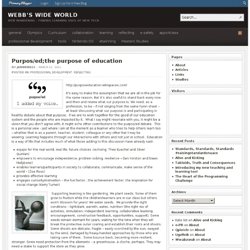
But it’s also useful to stand back every now and then and review what our purpose is. We need, as a profession, to be – if not singing from the same hymn sheet – at least discussing what our purpose is and participating in healthy debate about that purpose, if we are to work together for the good of our education system and the people who are impacted by it. What I say might resonate with you, it might be a vision that you don’t agree with, it might echo other contributions to the purpos/ed debate. This is a personal view - just where I am at the moment as a learner who tries to help others learn too – whether that is as a parent, teacher, student, colleague or any other hat I may be wearing.
Supporting learning is like gardening. rWorld2 » Blog Archive » The purpose of education is to increase empathy and equality – 500 words on #purpos/ed. I never did sign up for this, but, hey, the purpos/ed project is making a splash in our world and it is worth pitching in, even if my contributions are not timely, original or synthetic of what has gone before (see David Jennings, who took the synthesising route: Cristina Costa neatly exposes a key issue, saying, “… education is part of what we are and what we become” ( From this, I suggest that asking what the purpose of education is, is not far different from asking what our purpose is.
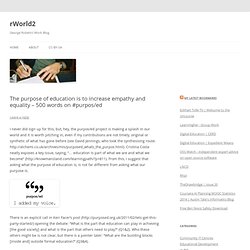
There is an explicit call in Keri Facer’s post ( opening the debate: “What is the part that education can play in achieving [the good society] and what is the part that others need to play?” (Q1&2). Who these others might be is not clear, but there is a pointer later: “What are the building blocks [inside and] outside formal education?” (Q3&4).
The d, the y, and the i « Idea Dog. Ed — #500words – David Jennings. Ed — #500words – Graham Attwell. Ed — #500words – Mark Allen. Kicking of the penultimate week of the 500 words challenge is Mark Allen.
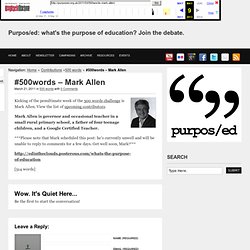
View the list of upcoming contributors. Mark Allen is governor and occasional teacher in a small rural primary school, a father of four teenage children, and a Google Certified Teacher. ***Please note that Mark scheduled this post: he’s currently unwell and will be unable to reply to comments for a few days.
Get well soon, Mark! *** [514 words] What is the purpose of education? Doug Belshaw kindly invited me to write 500 words on the purpose of education for his/Andy Stewart’s collaboration, Purpos/ed . I’m always banging on about the purpose of education. So, I wondered what some of my friends [not in education] would say when asked “what is the purpose of education? “about empowering people, gaining a sense of responsibility and self-worth, learning social skills and improving confidence which in turn, gives everyone equal opportunities to succeed”. [ ] “opening your mind to ideas and experiences beyond your own small life and surroundings.
Learning to challenge, test, implement, innovate.” [ ] “passing accurate information between people, in formal education, vocationally, socially, or even self-teaching. “not just about achievement, or the ability to speak eloquently and with knowledge. Ed — #500words – Paul Simbeck-Hampson. Purpos/ed. The purpose of education is to enable people to understand, navigate, contribute to, challenge and change the world. To many children and young people, adults seem distinguishable by their finishedness, their completeness. We have ‘grown up’. We have become inflexible, we have ceased to play, to imagine; our appetite for adventure has been diminished, not increased, by our understanding of the world; our wild and even gentle ambitions have been curtailed by the demands of making a living, of ‘the real world’.
Instead of growing in confidence and maturity enough to hazard risk, to be wrong, to change our minds, the adult world seems very often to promote an infantile belief in the benefits and possibility of absolute certainty, mastery, fixedness. Education should critically ensure children, young people and adults are equipped to be unsettled, to be confronted by difference, to be changed, and to effect change.
Education should make us anxious. This is my #500words for the Purpos/ed project: Firstly I’d like to make it clear that I think the education system in the UK is excellent. We hold education to be so important that we’ve made it a legal requirement to engage with it and to a large extent any failings in the system are a reflection of larger societal challenges. Media Studies is Shit. Purpos/ed — #500words – Jamies Michie. Purpos/ed — #500words – Theo Kuechel.
Purpos/ed — #500words – Dawn Hallybone. Purpos/ed — #500words – Martin Weller. What is the purpose of education? (in 500-ish words) What is the purpose of education? (Written as requested, and to contribute to, the #purpos/ed campaign) When reading this I need to make it clear that I’m not an expert in education. I know nothing about the many different kinds of literacies out there, scholarly theories on the functionality of cognitive acceleration or trans-educational warp drives (I made the last one up). I make comment only in reference to the context and experience of my work in low socio-economic areas of South Yorkshire, UK. The very aspect of ‘context’ is a central principle to my thoughts on the purpose of education. Essentially, the outcome ought to be a knowledge/skill set that enables people to achieve what they may not have been able to achieve if not for education. I love how Ian Gilbert opens chapter 1 of his book: ‘Essential motivation in the classroom’: ‘Bad news I’m afraid.
The current educational establishment in the UK seems to be placing everything on qualifications such as the GCSE. Let me know. Figure out what you want. Figure out how to get it. Get it. #purposed. When I left school at 18, my history teacher wrote the words above in my leavers book. A simple message, but I think it is a pertinent one when discussing the purpose of education.
Several of the writers contributing to this debate already have discussed the importance of learning experiences that have nothing to do with school.